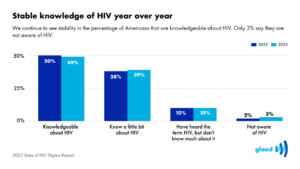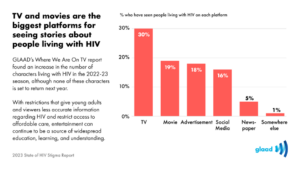Contact: press@glaad.org
Join GLAAD and take action for acceptance.
Trending
- We All Could Use Some Queer Joy! Be a Part of The Skin Deep + GLAAD’s New Collab
- Facts and Action for Banned Books Week
- Write It Out! Launches Annual Campaign to Uplift People Living with HIV Through Playwriting
- GLAAD Gaming Announces New Queer Emerging Developers Program
- Finding Yourself Begins With Celebrating Others’ Differences
- Must-See LGBTQ TV: October Premieres and Returns!
- Fact Sheet: Landmark Supreme Court Case Regarding Protections Against So-Called Conversion “Therapy” for Youth
- Lessons Learned: On Organizing for Inclusive and Welcoming School Systems
GLAAD MARKS WORLD AIDS DAY 2023 WITH LAUNCH OF GLOBAL RESOURCE HUB AND REALITY CHECKS ON THE STATE OF HIV STIGMA AND REPRESENTATION OF HIV-RELATED STORYLINES AND CHARACTERS ON-SCREEN, ANNOUNCES LOCAL SCREENINGS OF BEYONCÉ’S RENAISSANCE
GLAAD’s State of HIV Stigma Report found less than half of Americans feel knowledgeable about HIV GLAAD research found only one character in one film out of 350 films studied was living with HIV GLAAD’s research revealed characters on TV portrayed as living with HIV will not return
New York, New York – Friday, December 1, 2023 – GLAAD, the world’s largest lesbian, gay, bisexual, transgender, and queer (LGBTQ) media advocacy organization, marked World AIDS Day this year by sharing the results of its fourth annual State of HIV Stigma Report, a national survey among U.S. adults measuring knowledge and attitudes among Americans about HIV. Additionally, GLAAD shared entertainment research and analysis to reflect the lack of representation in on-screen storytelling around HIV storylines and characters living with HIV. GLAAD also launched a World AIDS Day and HIV Global Resource Hub, providing resources and guidelines to journalists, creators and the general public, for cultivating fair and accurate reporting and sharing of experiences related to HIV, treatment & care, and of people living with undetectable HIV.
World AIDS Day has been observed on December 1 every year since 1988 and serves as a reminder of the global struggle to end HIV-related stigma. This year’s theme for World AIDS Day is “World AIDS Day 35: Remember and Commit.” Today, reiterated by new guidance from the World Health Organization, we know Undetectable = Unstransmittable and equals Zero Risk.
From GLAAD President & CEO, Sarah Kate Ellis:
“On this 35th observance of World AIDS Day, GLAAD is reenergized in its commitment to achieve a future without HIV. Today, as we remember the millions of lives lost around the world, we also reaffirm the reality that we have all the tools to end this epidemic: game-changing HIV treatment which has extended the lifespan of people living with HIV to near normal expectancy and prevention methods like PrEP (pre-exposure prophylaxis) which reduce the risk of acquiring HIV by 99% when taken as prescribed. GLAAD research also shows that Gen Z, the most LGBTQ generation, is the least knowledgeable about HIV compared to Gen X, driving home how meaningful visibility and representation of HIV-inclusive characters and storylines are needed more than ever. GLAAD remains steadfast in our determination to amplify accurate and inclusive information about HIV to erase HIV stigma. Ending HIV should be every generation’s lasting achievement.”
THE STATE OF HIV STIGMA
In partnership with the Gilead COMPASS Initiative, the findings of GLAAD’s 2023 State of HIV Stigma Report tracked progress against HIV stigma, transmission and prevention of HIV, and attitudes and knowledge of people living with HIV in the United States. The report also showed continued progress in important areas of visibility and awareness, including rising knowledge that medications exist to prevent HIV and treat HIV to the point of an undetectable and, therefore, untransmittable HIV status (U=U).

Key Findings:
- Nearly 90% of Americans believe there is still a stigma around HIV.
- 85% of Americans believe HIV prevention should be taught in schools.
- 80% of Americans agree with criminalizing non-disclosure HIV status, which further stigmatizes people living with HIV.
- 65% of Americans reportedly agree that everyone should be tested for HIV in their lifetime, a decrease from the reported 70% who agreed in 2022.
- Over 60% of Gen X’ers say they are knowledgeable about HIV, compared to 34% of Gen Z adults say the same.
- 49% of American feel they are knowledgeable about HIV.
- 37% of Americans inaccurately believe HIV mostly impacts LGBTQ people
- This figure is up from 33% a year ago.
- 32% of Americans report feeling discomfort interacting with a co-worker living with HIV, an increase from the reported 29% who experienced discomfort in 2022.
See, Share and Download the Report HERE
Social Graphics and Toolkit HERE
THE STATE OF HIV REPRESENTATION ON-SCREEN
Television and film are the largest platforms and vehicles for seeing stories about people living with HIV over other forms of entertainment and media like advertisements, digital/social media, and print. GLAAD’s 2023 State of HIV Stigma Report found just under 35% of Americans say they’ve seen stories about people living with HIV in the last year, up 4% from the previous year. Despite this slight increase in visibility, the data clearly punctuates the need to fill this representation gap, with supermajorities of Americans reporting not having seen stories about people living with HIV in the media at all.
GLAAD’s 2023 Studio Responsibility Index, which tracks the quantity, quality, and diversity of LGBTQ characters in theatrical film slates from major studios, found out of 350 films included studied, only one character in one film was portrayed as living with HIV.

Across television, GLAAD’s 2022 Where We Are in TV Report, which assesses and analyzes the number of LGBTQ regular and recurring characters across television networks, revealed that of the 596 LGBTQ characters found across broadcast, cable and streaming scripted television from the 22-23 TV season, only eight characters (1.3%) were counted as living with HIV. None of these characters will return.
LGBTQ stories told through film and TV have a powerful and inextricable link to culture-change, key to breaking stigma and stereotypes around HIV and people living with undetectable HIV. Despite progress and growth in LGBTQ representation in film and TV, the studio-prolonged strikes this year in Hollywood will have immediate effects on the prospect of future visibility of key storylines and characters, including but notwithstanding projects becoming stalled or canceled, hindering progress and growth in this arena. With more people than ever now empowered to live authentically and openly, the cost of lost progress in LGBTQ representation on-screen means erasure.
GLAAD WORLD AIDS DAY 2023 PROGRAMS AND EVENTS
Renaissance: A Film by Beyoncé Community Screenings
GLAAD’s Communities of Colors Department will bring special screenings of Renaissance: A Film by Beyoncé, to a number of local communities nationwide tied to World AIDS Day. The special screenings will take place in New York City, Atlanta, Georgia, Birmingham, Alabama and Nashville, Tennessee. Screening attendees will include local creatives including MashUP! Nashville, Nashville Black Pride, Nashville CARES/My House, Nashville Pride, and HBCU’s Tennessee State University’s Safe Zone, as well as alumni from GLAAD’s inaugural Black Queer Creative Summit.
Renaissance: A Film by Beyoncé, premieres in theaters nationwide on World AIDS Day (December 1st) in honor of Uncle Johnny, Beyonce’s Black queer uncle who was living with HIV. Renaissance: A Film by Beyoncé is a captivating documentary that offers an intimate look into the life and artistry of the iconic Beyoncé Knowles-Carter, taking us on a journey through her incredible career and creative process.
Arts, Culture and Black Wellness! in Atlanta
GLAAD is working in partnership with Emory COMPASS Center, in partnership with Gilead Sciences, Inc.; the City of Atlanta Office of Equity, Diversity, and Inclusion; Division of HIV Prevention, CDC; THRIVE SS; LOTUS; and the Black Women’s Health Imperative, to present: Arts, Culture and Black Wellness!
Embark on a journey of resilience and hope over two inspiring days, December 1 & 3, 2023, at the beautiful Buckhead Art & Company Art Gallery in Atlanta, GA. Immerse yourself in the unveiling of the extraordinary “Stories of Triumph” art exhibit featuring Partners of the Gilead COMPASS Initiative®, partake in the richness of cultural experiences, and delve into the realm of wellness.
Join us for this celebration of Black wellness. Arts, Culture and Black Wellness promises to be an artistic and unforgettable experience.
Event registration remains open to the public HERE.
GLAAD GUIDES AND RESOURCES
GLAAD was created in 1985, by journalists and writers determined to hold the media accountable for grossly defamatory and inaccurate media coverage of HIV and HIV patients. Today, remarkable scientific progress has made HIV a preventable, treatable, and when treated properly, untransmittable condition. As stigma continues to fuel the epidemic of HIV, GLAAD provides resources and guidelines to journalists and creators to cultivate fair and accurate reporting and sharing of experiences related to HIV, treatment & care, and of people living with undetectable HIV.
- GLAAD’s World AIDS Day Resource Hub aggregates all of GLAAD’s HIV resources and spotlight’s HIV.gov’s HIV testing and health services locator which includes resources around mail-in self testing, STI testing and treatment, Mpox vaccines and mental health.
- GLAAD Media Reference Guide – In Focus: HIV and the LGBTQ Community
- GLAAD has also published a Fact-Sheet on federal efforts to end HIV/AIDS
- GLAAD’s Southern Story Bank features profiles of people living with HIV and advocates elevating facts about HIV and equitable health care for LGBTQ people in the U.S. South.
ADDITIONAL HIV FAST FACTS
Facts about HIV:
- People living with HIV today, when on effective treatment, lead long and healthy lives and cannot transmit HIV. Treating HIV can suppress the virus to the point it is no longer detected. When HIV is undetected, it is untransmittable, the key message of the U=U campaign.
- According to the Centers for Disease Control and Prevention (CDC), nearly 40% of new HIV infections are transmitted by people who don’t know they have the virus.
- Black Americans account for more HIV diagnoses (43%), people living with HIV (42%), and the most deaths among people with HIV (44%), more than any other racial and ethnic group in the U.S. Black Americans are just 12% of the U.S. population.
- The CDC reports that the U.S. South experiences the greatest rates of HIV and lags behind in providing quality HIV prevention services and care.
- According to the National HIV/AIDS Strategy (NHAS): New HIV infections in the U.S. have declined in recent years, after a period of general stability. Estimated annual new HIV infections were 12% lower in 2021 compared to 2017—dropping from about 36,500 infections to about 32,100, putting us in a good starting position as we began our work to implement the Strategy.
- According to the National HIV/AIDS Strategy (NHAS): Overall, in 2022, 36% of the 1.2 million people in the U.S. who could benefit from PrEP were prescribed it, compared to 23% in 2019, though significant racial/ethnic and gender disparities persist.
About GLAAD:
GLAAD rewrites the script for LGBTQ acceptance. As a dynamic media force, GLAAD tackles tough issues to shape the narrative and provoke dialogue that leads to cultural change. GLAAD protects all that has been accomplished and creates a world where everyone can live the life they love. For more information, please visit www.glaad.org or connect @GLAAD on social media.
Add A Comment
Related posts
Share this
Join GLAAD and take action for acceptance.
ALERT Desk Incident Reporting
Our Picks
Topics
Don't Miss
This resource was created as a collaboration between GLAAD, The Trevor Project, and the Movement…












